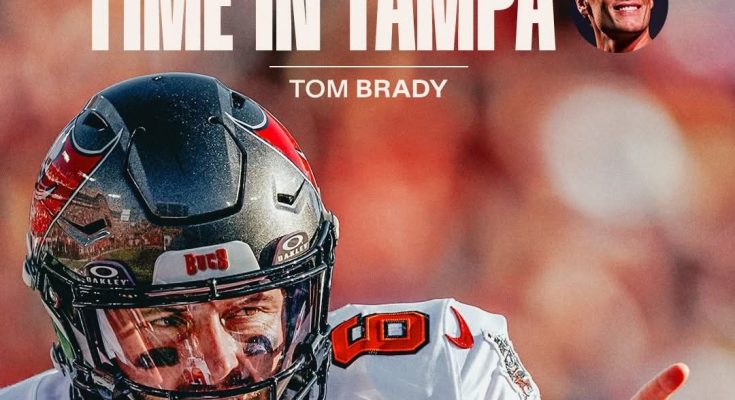Tom Brady, often referred to by his nickname “TB12,” has become more than just a football player. He’s a symbol of discipline, longevity, and relentless pursuit of excellence. When someone says “TB12 knows what time it is,” it implies more than just an awareness of the clock—it’s about knowing when to rise, when to strike, when to lead, and when to silence doubt. It’s a metaphor for control, for timing things perfectly, for reading the moment and dominating it.
The phrase is an embodiment of who Brady became over two decades in the NFL. Drafted in the sixth round with the 199th overall pick in 2000, few expected him to amount to much. He wasn’t fast. He didn’t have the strongest arm. His NFL Combine photo, famously unathletic, was more “dad bod” than quarterback physique. But what he lacked in physical gifts, he more than made up for in understanding time—how to use it, how to respect it, how to manage it better than anyone else. Time is everything in football, from the play clock to the two-minute drill, and no one has commanded it more effectively than TB12.
He first showed the world what time it was in 2001, when he took over as the New England Patriots’ starting quarterback after Drew Bledsoe went down. It wasn’t supposed to be Brady’s moment. It wasn’t supposed to be his time. But he made it his. He led that team to a Super Bowl victory over the heavily favored St. Louis Rams, known as “The Greatest Show on Turf.” He wasn’t flashy. He didn’t throw for 400 yards. He managed the game, controlled the clock, and delivered when it counted. That final drive, with no timeouts left, still echoes in NFL lore. That’s when people started realizing: TB12 knew what time it was.
As the years passed, Brady didn’t just maintain success—he evolved. His playbook expanded. His vision sharpened. He became a master of preparation, often quoted saying that his success came from the fact that he knew every possible scenario before it happened. He studied endlessly. His diet, his workouts, his sleep patterns, everything was timed with precision. He popularized pliability and recovery techniques long before they became mainstream. For him, aging wasn’t an obstacle—it was a challenge to overcome with data, science, and commitment. He understood that time, the great enemy of all athletes, could be manipulated. Not defeated, but managed. He didn’t run from it. He respected it, studied it, and learned how to live with it.
During his time with the Patriots, Brady won six Super Bowls and played in nine. That kind of dominance isn’t accidental. It requires sustained excellence over time, a rare achievement in the salary-cap era of the NFL. He had to reinvent himself constantly, playing with new teammates, adapting to new game plans, and proving again and again that he still had “it.” Critics emerged each year, saying his time was up. And each year, he responded not with words, but with wins.
Then came perhaps the boldest declaration that he knew what time it was—his decision to leave New England. After 20 years with Bill Belichick, Brady walked away from the system that made him and chose to join the Tampa Bay Buccaneers, a franchise with a losing culture and no recent history of success. Many doubted the move. They said he was a system quarterback, that he wouldn’t thrive without Belichick. They said time had finally caught up with him.
But again, he proved them wrong. In his first season with Tampa Bay, amidst the challenges of COVID-19 and without a full offseason, Brady led the Buccaneers to a Super Bowl title, beating Patrick Mahomes and the Kansas City Chiefs. It wasn’t just a win; it was a statement. It was the ultimate “I told you so.” He had done it his way, on his terms, in his time.
What makes Brady’s story so compelling isn’t just the trophies or the statistics. It’s the understanding that greatness is a choice made every day. It’s the early mornings, the sacrifices, the humility to keep learning. It’s the cold acknowledgment that time is undefeated—but that doesn’t mean you have to lose. You just have to manage it better than the rest. TB12 did that. And he did it longer than anyone expected.
When Brady finally retired—truly retired—he didn’t do it because he couldn’t play anymore. He didn’t limp out of the game like so many legends do. He left still capable, still sharp, still winning. He walked away on his own terms, with the clock in his hand. That’s knowing what time it is. It’s knowing when to say goodbye before the game says it for you.
Even after retirement, his presence remains strong. He’s not disappearing. Through his TB12 brand, media ventures, and likely future broadcasting career, Brady continues to influence the game, the culture, and the mindset of athletes everywhere. His message is consistent: take care of your body, master your mind, respect the process, and never waste time. Every second counts, whether you’re trailing in the fourth quarter or making choices in the offseason. It all matters. Brady never coasted. He never let the clock dictate his story. He controlled it.
That’s why “TB12 knows what time it is” hits deeper than just a clever phrase. It’s a philosophy. It’s about readiness. It’s about anticipation, discipline, and seizing the moment before it slips away. It’s about understanding that your time is finite, but within that window, you can achieve the impossible if you truly commit. You don’t need to be the biggest, the fastest, or even the most talented. You need to be aware—of the moment, of yourself, and of the opportunity in front of you.
Brady’s story is as much about mindset as it is about football. Every athlete has physical tools, but very few can stretch their prime the way he did. His ability to maintain peak performance into his 40s wasn’t luck or genetics—it was work. It was strategy. It was complete and total awareness of how time impacts performance. His self-awareness is what truly separated him. He knew when to push and when to pull back. He knew how to prepare for each season with surgical precision. He wasn’t emotional in his decisions. He was methodical.
And in the clutch moments, with the game on the line, he never flinched. The reason fans, players, and coaches feared Brady in the final minutes was because they all knew: if there was time left on the clock, TB12 still had a shot. And that meant you were never safe. That kind of psychological edge is rare. It’s earned. And it only comes from someone who knows, deep down, what time it really is.
Beyond football, that same mentality applies to life. Brady’s example is a reminder to manage our time better, to approach each day with intent. To wake up with a plan. To invest in ourselves. To outwork the doubt. Whether you’re in a boardroom, in school, building a business, or chasing a dream, the rules are the same. Preparation beats talent when talent isn’t prepared. Time waits for no one, but it rewards those who respect it.
So when someone says, “TB12 knows what time it is,” they’re not just talking about a quarterback lining up behind center. They’re talking about a man who beat the odds, defied aging, crushed expectations, and never let the moment overwhelm him. They’re talking about someone who answered every question with action, who let his results speak, who outlasted the hype and rewrote the standards for what greatness looks like.
Brady’s legacy isn’t just in rings or MVPs. It’s in the mindset he embodied. It’s in the countless athletes now investing more into their recovery, into their nutrition, into the small details that Brady mastered. He didn’t chase trends—he set them. He didn’t wait for permission—he took initiative. He understood timing better than anyone, both on and off the field. And that’s why his story continues to resonate.
Because when you really think about it, time is the one opponent no one ever beats. But Tom Brady came closer than anyone ever has. And he did it not by ignoring the clock, but by mastering it. By making every second count. By knowing, better than anyone, exactly what time it was.


